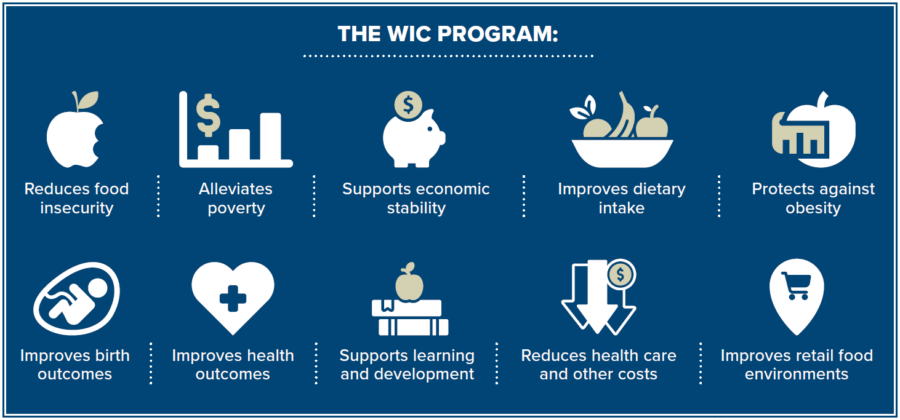May 5, 2022
On May 8, families across the United States will celebrate Mother’s Day. To celebrate, FRAC is shining a spotlight on The Special Supplemental Nutrition Program for Women, Infants, and Children (WIC) to highlight the impact this program has in reducing food insecurity and nutrition-related health problems in pregnancy, infancy, and early childhood. WIC directly supports individuals who are low income and pregnant, postpartum, or breastfeeding, or have infants and children up to five years old, by providing nutritious foods, nutrition education, and improved access to health care.

Below are eight ways that can maximize the impact of WIC and increase participation:
- Work With Health Care Providers to Connect Families to WIC
In order to maximize the benefits of WIC , it is crucial to work with health care providers, such as pediatricians, to improve WIC outreach and referrals. FRAC, along with the American Academy of Pediatrics (AAP), developed a Screen and Intervene Toolkit and WIC Guide for Health Care Providers as a way for pediatricians to assess food insecurity among patients and make effective referrals to WIC. Health care providers’ referrals to WIC help reduce barriers to food access. Watch a recent AAP/FRAC training on how pediatricians can connect their patients to WIC. - Spread the Word on WIC’s Fruit and Vegetable Benefit Increase
WIC’s monthly fruit and vegetable benefit is doubled for children and tripled for pregnant and postpartum individuals now through September 2022. FRAC has developed a communications toolkit to help you spread the word and make the most of the increased benefit. The toolkit includes customizable social media graphics and captions, emails, flyers, text messages, and website updates. - Support Continued Remote Enrollment, Services, and Benefit Issuance Options
Flexibilities offered via WIC waivers during COVID-19 have allowed participants to complete enrollment and education appointments from a convenient location over the phone, reducing barriers to WIC participation. Parents and caregivers across the country broadly support the ability to have WIC enrollment and services via phone, and remote benefit issuance. Advocates can help modernize and streamline the WIC program by supporting making permanent the flexibilities that allow for remote enrollment, services, and benefit issuance, and facilitate online ordering. Learn more about legislative priorities for WIC in FRAC’s Child Nutrition Reauthorization Priorities brief. - Increase Awareness About WIC’s Nutrition and Breastfeeding Support
WIC is required to provide high quality and accessible nutrition education to participants on a quarterly basis. It’s often the only reliable source of nutrition counseling for women in low-income communities. Nutrition education and breastfeeding counseling is tailored to meet the needs of families from diverse backgrounds. WIC breastfeeding support has nearly doubled the amount of WIC mothers who breastfeed, leading to better outcomes for newborns. Advocates can increase awareness about WIC’s nutrition and breastfeeding support by informing potentially eligible families about the program and connecting young children and families to WIC. - Increase Awareness About Children’s Age Limit for Eligibility
Many families are unclear about how long they or their child qualify for WIC benefits. Children and their families can continue to receive benefits from birth up to 5 years old. The longer that a child stays on WIC, the longer they will receive the support and access to the nutrition they need to grow up healthy and strong. According to the USDA, the portion of eligible people participating in WIC drops steadily as children get older, from 65 percent for 1-year-olds to 25 percent for 4-year-olds. - Offer Support for Other Primary Caregivers like Grandparents
Grandparents are the primary caregiver for six percent of children under 6 years old.The opioid epidemic, methamphetamine addictions, increased incarceration of women, economic stress, and military deployment have all contributed to the rise of grandparents raising grandchildren. There is an opportunity for WIC partners to integrate WIC resources and referrals into agencies and programs serving grandparents raising grandchildren like kinship care programs. Learn more in a FRAC fact sheet. - Mitigate Fear and Reduce Barriers for Immigrant Families
Many eligible immigrant families are not participating in WIC. Immigrant parents, including legal permanent residents and parents of citizen children, increasingly believe their families are not eligible for WIC or that there will be negative repercussions for participating. It’s important to mitigate that fear and help these families understand that there’s no public charge rule associated with WIC and that their personal information will not be shared.Another important way to reach immigrant families is through targeted outreach, promotion, coordination and referrals that reflects the language, culture, and ethnicity of each immigration population. Specific strategies can be found in FRAC’s 2019 report Making WIC Work Better (pgs 41–43). - Urge Congress to Take Action Through Child Nutrition Reauthorization
Advocates can help expand access, reduce barriers, and strengthen WIC by urging their members of Congress to include the Wise Investment in Children (WIC) Act as part of Child Nutrition Reauthorization. The WIC Act (1) extends the WIC certification period to two years, (2)extends program eligibility for children from 5 years until their sixth birthday, and (3) extends postpartum eligibility to two years for all mothers. Learn more on FRAC’s Bill’s We’re Supporting webpage.
This Mothers’ Day let’s recognize the benefit of the WIC program and help connect eligible families to the program.

